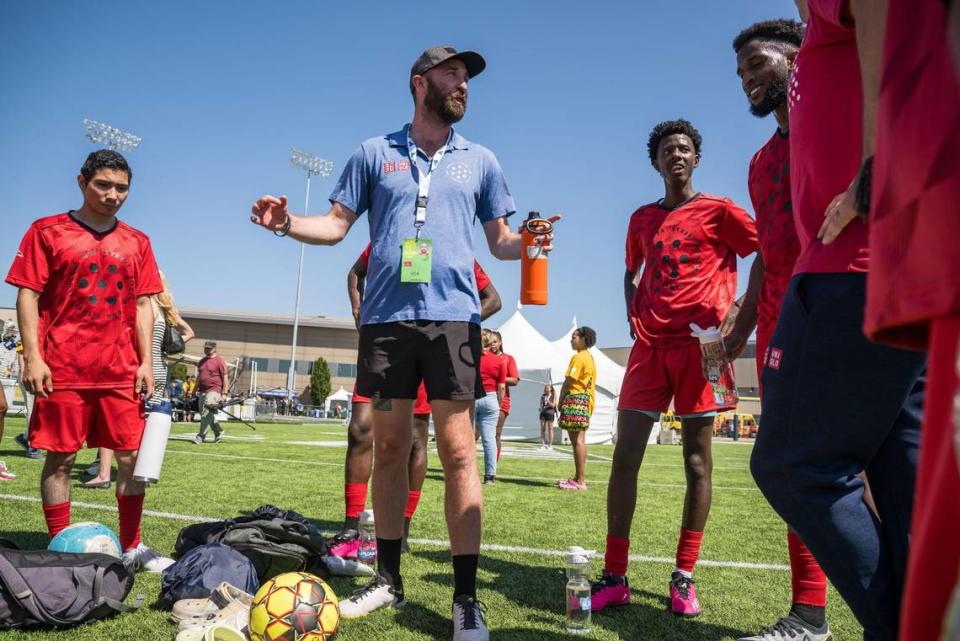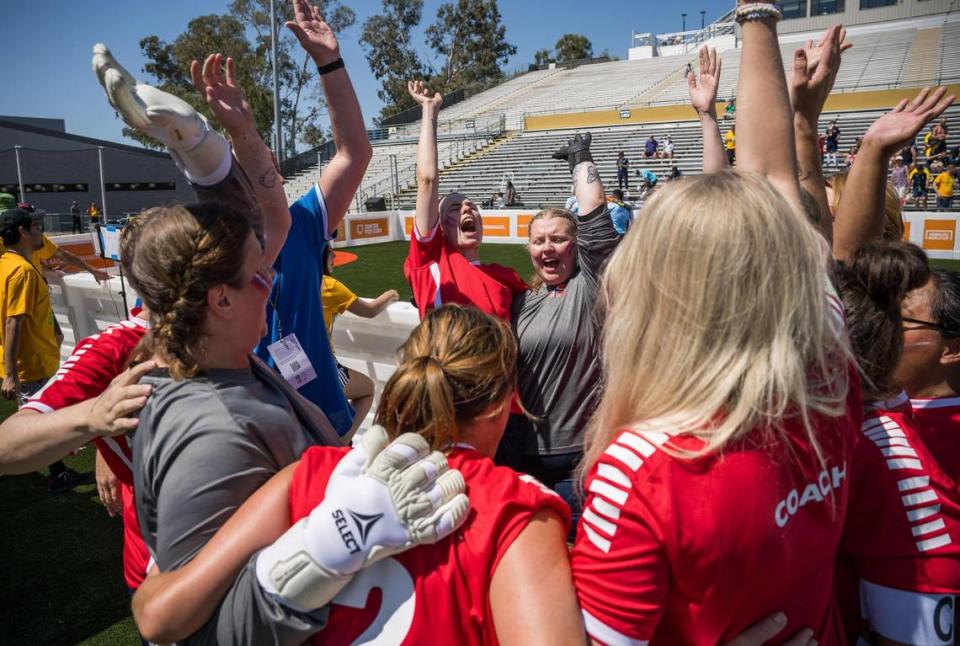‘Forget your issues and become an athlete’: Homeless World Cup kicks off in Sacramento
Three women in red Street Soccer USA jerseys passed between each other, two Finnish players stuck in between. In this game of street soccer Saturday, the normally high-scoring 15-minute game played in a 72-by-52-foot walled court, the scoreline was 0-0 at halftime.
Finally, 18-year-old Yuli Pineda clattered the ball into Finland’s net, and the momentum built. The scoreline at the whistle was 3-0 for USA. The next game was faster paced, USA’s men’s team won, 8-3, against Indonesia.
The teams – eight men and eight women, with two coaches for each team – were jubilant. It was the first time that Team USA won both opening games in 20 years of the Homeless World Cup, as far as women’s team coach Jose Acuna could remember.
Jubilance is what the eight-day tournament is all about.
Every player on the pitch had experienced homelessness in the past two years. Some have found stable housing and made plans for work or school, while others are still working on it. But on the pitch of Sacramento State’s Hornet Stadium, vying to win in a field of 40 national teams and 400 players, “you forget about all your issues and become an athlete that just wants to achieve goals in the field,” Acuna said.

Founded by Scottish and Austrian social entrepreneurs Mel Young and Harald Schmied in 2003, the Homeless World Cup comes to Sacramento for a full week of games — two per team per day until finals next Saturday — after stops in Mexico City, Melbourne, Paris and other major cities around the world.
The Cup’s mission is to work with grassroots organizations across the world to provide unhoused people with community and dignity, helping them better their situations and changing public perceptions of homelessness.
The Sacramento event, which opened with remarks from Mayor Darrell Steinberg and outgoing Sacramento State President Robert Nelsen, was difficult to organize due to the Cup’s three-year pause due to the COVID-19 pandemic, said Lisa Wrightsman, managing director of Street Soccer USA and co-founder of its Sacramento chapter.
Wrightsman herself struggled with homelessness and substance abuse after graduating from Sacramento State in 2002, playing in the Homeless World Cup before becoming involved behind the scenes. Watching the festive opening’s athlete parade was “kind of surreal, but exactly what we hoped it would be,” she said.
“I hope that we can latch onto the goal of what it looks like when someone receives the services that they need so they can have a life again,” Wrightsman said. “We want people to know that you can overcome (homelessness), that your life can look good again, but we gotta take those first steps.”

Christopher Cambises, a spokesman for British Consulate General in San Francisco, also highlighted the Cup’s utility in connecting policymakers across countries. As part of the tournament, Sacramento State will also host a symposium on solutions to end homelessness Wednesday.
“It helps to identify an issue that affects many different countries all over the world, and that there are shared solutions,” Cambises said. “If this event helps to spur a dialogue, that is something that we certainly welcome and look to explore.”
Pineda is one of two Sacramentans on the USA women’s team. She’s been in the foster care system for 2½ years, and started playing with a local street soccer program through a connection in her foster family’s church.
Being with others at the Cup who have been “at the same place as you and now are in a better place” is “a feeling that cannot be replaced,” Pineda said. Aside from her teammates, who come from all over the country, she’s connected especially with the Korean and Mexican teams, the latter because she speaks Spanish and has received support from a lot of Mexican people in her life, she said.
“It’s human nature that we like to identify with other people ... when it’s something bad that you overcome, it’s an even greater feeling. Because identifying is one thing, but identifying as going from the floor to the stars is (amazing),” she said.
After the tournament, she plans to start studying business at American River College in the fall and take part in its soccer program to take a shot at going pro. For now, she just wants to bring her full energy to the team, she said.
“This is my whole dream since I realized that I wanted to play soccer, to represent the U.S.,” Pineda said.
If you go
What: Homeless World Cup 2023
Where: Hornet Stadium at Sacramento State, 6000 Jed Smith Dr.
When: Through Saturday, July 15
Time: Games start at 9 a.m. or 5 p.m. depending on the day, see the full schedule here.
Tickets: Free but with a suggested $20 donation, reserve online here.
Watch virtually: Games will be livestreamed on YouTube here.
Website: 2023homelessworldcup.org


